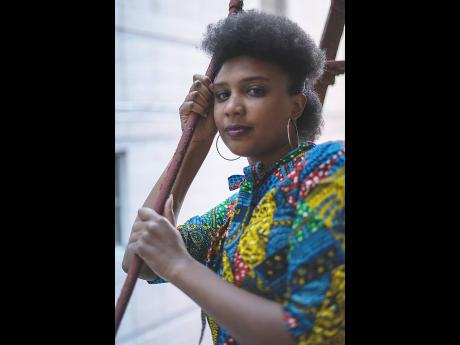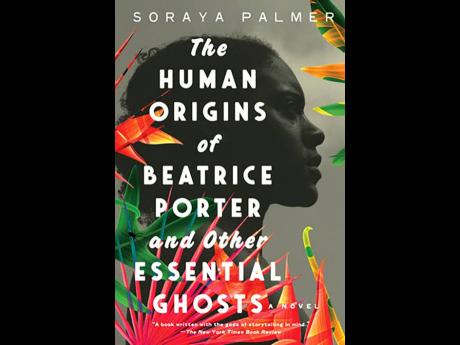Critically acclaimed author Soraya Palmer working on sophmore effort
Becoming a novelist was always on the cards for Soraya Palmer.
Taking the reins fate afforded, the American-Caribbean creative departed her nine-to-five as a social worker after her fictional tome The Human Origins of Beatrice Porter and Other Essential Ghosts enjoyed a smooth debut in March last year with rhapsodic critical acclaim and an enthralled readership.
“At the time I was working with women who were criminalised for resisting abuse by their partners. I realised it was too overwhelming for me to juggle that kind of work full time while also following my creative pursuits. Since then, I’ve been trying to figure out a way to make writing a bigger part of my career,” reflected Palmer, who currently teaches writing at City College and at the Center for Fiction in New York.
Her 277-page yarn – whose plot line revolves around two sisters in a family coming apart at the seams interwoven with mythological tales of Caribbean origin told to them by their parents – was hailed by The New York Times as “ambitious and passionate” while Booklist trumpeted it as “vivid and otherworldly, this masterfully told novel brings together many threads of family history, personal memory, collective choices, sexuality and a realm of mysteries and mythic creatures with deep origins and powers.”
Bolstered by the groundswell of glowing reaction to The Human Origins, Palmer told The Gleaner what has elicited particular joy for her was making college visits. “It has been really exciting because I’ve been able to meet with young people and hear how the book has touched them. I always love hearing their questions and aspirations for writing. Many of the students also made artwork inspired by my book! I’ve gotten copies of origami spiders, crossword puzzles, and playlists inspired by my novel. It has been a heartwarming and surreal experience. Meeting my Caribbean readers in Trinidad at the Bocas Lit Festival was also an exciting experience because I had been anxious about what the response would be in the Caribbean, but thankfully it’s been positive so far. I have even met readers who told me they were really looking forward to meeting me at Bocas once they saw my name on the programme. And, of course, I can’t forget all the writing idols I was able to meet in person in Trinidad such as Edwidge Danticat and Earl Lovelace.”
Born to a Jamaican business refinancer father and Trinidadian ortho-bionomist practitioner-yogi mother, the 39-year-old novelist – one of four children for her parents – shared: “I don’t think I would be a writer without the stories they told us as kids, the books my mom read to me, and the dinners [we had] around the table creating one sentence stories.” She recalls her parents telling her stories about the rolling calf and the lagahoo and other Caribbean folktales that ended up in her book. Palmer’s uncle is famous writer C. Everard Palmer, known for books such as The Wooing of Beppo Tate, A Cow Called Boy and My Father Sun Sun Johnson. She also recalls living in Trinidad for seven months – before pursuing her Master of Fine Arts at Virginia Tech – and taking history classes at The University of the West Indies, St Augustine, as a significant turning point for her debut novel.
Now at work on her sophomore effort: a memoir in essays called, A Visibility Spell, the writer and kickboxer also works part-time as a therapist and is giving serious consideration to someday opening her own practice. She disclosed that this upcoming book “will chronicle my time in my 30s navigating the politics of desirability and beauty as it relates to finding love for black women. The book will also explore mental health and the way we use magic.”
She’s also considering the possibility of making The Human Origins a trilogy book series.
“Book one (Human Origins) shows the two sisters, Zora and Sasha, as children going into adulthood. Book two would show them at the beginning of their twenties and the struggles that come in early adulthood. The third book would have the sisters in their 30s in a reimagining of 2020. What would it have been like if we did revolt in 2020, where would we be?”
Should the rights to The Human Origins ever be optioned for a film, Palmer’s dream cast would include Tobagonian actor Winston Duke as the family patriarch Nigel. “I think he would do a great job being a commanding presence that is at once charming and frightening. I think he would beautifully embody some of Nigel’s harsher qualities with complexity and nuance. It also helps that he’s from the Caribbean. I would also love to see Angela Bassett play a role, perhaps as Ma. She has played some of my all-time favourite on-screen moms, from the mother of Michael Jackson to the mother of the Black Panther. She plays all her roles with power, wisdom and grace.”
With wordsmith faves comprising Toni Morrison, Junot Diaz, and Lynda Barry, Palmer who is a professed fan of new art shows and exhibits, jazz nights and book events, has a recently relished copy of Victor LaVelle’s The Changeling laying by her bedside. “I absolutely loved it. The novel felt like a love letter to New York City and incorporated a lot of folklore and magical realism into the horror genre beautifully.”


